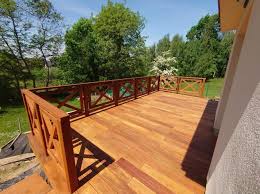When designing or upgrading large outdoor spaces, choosing the appropriate deck board material is vital to ensure both durability and aesthetics. Here’s what you need to know about Deck boards (Deski tarasowe) alternatives to help you make an informed decision.
1. Wood Decking
Wood decking is a classic and popular choice because of the natural appeal and warmness. The most common types include:
Pressure-Treated Lumber It is the most cost-effective option and is treated to resist decay and insects. However, it does require regular maintenance that includes sealing and staining.
Cedar and Redwood: These woods are naturally resistant to insects and decay. They offer rich colors and are less prone to warping than pressure treated lumber. They do require periodic sealing to maintain their appearance.
Exotic Hardwoods options like ipe and mahogany are incredibly durable and impervious to weather and insects. They are more expensive but they offer a distinctive look and long-lasting.
2. Composite Decking
Composite decking is a manufactured product combining wood fibers and plastic. It provides many benefits:
Low Maintenance: Unlike wood, composite decking does not require regular staining or sealing. It’s resistant to insects, rot, and fading, which makes it an easy maintenance option.
Durability: Composite boards are designed to withstand harsh weather conditions and high foot traffic without warping or cracking.
Many eco-friendly products are made of recycled materials, making them more environmentally friendly.
3. PVC Decking
PVC (polyvinyl chloride) decking is a synthetic option that has a superior level of tensile strength:
Waterproof Decking made of PVC is impervious to water, which prevents issues like mold and mildew.
Stain and Scratch Resistant: Its surface is highly resistant to stains and scratches and maintains its appearance with minimal effort.
Different styles to choose from: PVC decking is available in a variety of colors and textures and can be customized to suit different design preferences.
4. Aluminum Decking
The use of aluminum decking isn’t as widespread but offers unique advantages:
Extremely Durable: Aluminum is strong and resistant to the elements. It isn’t affected by warping, rust, or crack.
Low Maintenance: Just like PVC, aluminum requires little maintenance and is easy to clean.
Aluminum boards are light: They’re more lightweight than composite and wood options, making them easier to move and install.
Choosing the Right Deck Board
When selecting decking for a large outdoor area, consider factors such as the climate, maintenance requirements, budget, and design goals. Wood offers traditional charm but is prone to maintenance, whereas composite and PVC are more durable and require less maintenance. Aluminum is a great choice for those who want long-lasting performance.
Consider your requirements and preferences before choosing the decking material that best fits your outdoor space. Make sure it adds to the utility and appeal of your outdoor space.

